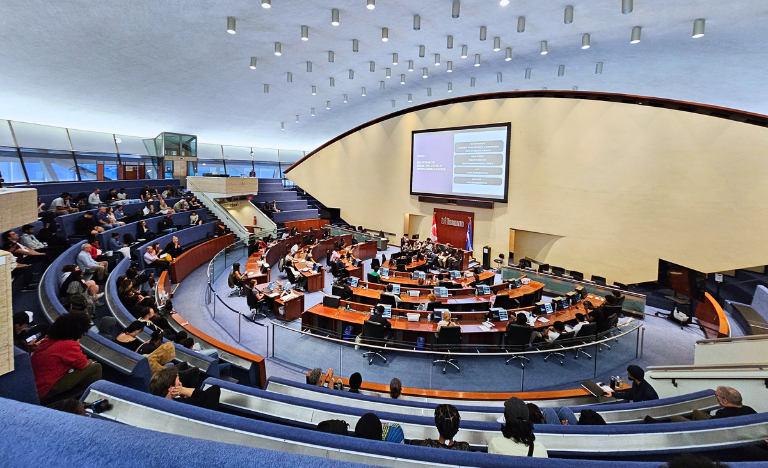On Monday, August 25th, over 100 youth and sector leaders filled the council chambers of Toronto City Hall to call for a strategy to respond to, prevent and work to end youth homelessness.
Following the recent release of the City of Toronto’s Street Needs Assessment, which found that more than 1,500 young people are experiencing homelessness on any given night in Toronto, the Toronto Youth Homelessness Summit raised critical awareness on the issue of youth homelessness and evidence-based interventions that help break the cycle early.
Hosted by the Toronto Youth Cabinet, Covenant House and sector partners, the summit also highlighted opportunities to collaborate on solutions that will help proactively address youth homelessness and respond in a way that will help young people on their journeys forward. The youth that attended the summit brought their experiences with homelessness to the discussions, their voices key in helping to shape a strategy that meets their needs.
“Youth homelessness is a growing emergency in Toronto, and we need bold action to prevent today’s youth from becoming tomorrow’s chronically homeless adults,” said Mark Aston, CEO of Covenant House Toronto. “Evidence from here in Canada and across other countries shows us that positive outcomes are very possible with the right help at the right time.”
Other cities across North America working towards addressing youth homelessness have developed strategies that are designed to work for their community locally. These youth specific strategies highlight that youth homelessness is distinct from adult homelessness, and so solutions must be tailored to the unique developmental, social, and economic realities that young people face.
Research shows that the most effective way to prevent youth homelessness is by helping youth stay in school, remain in their community and build or repair bridges to family and caring adults in their lives. Supporting youth with much needed access to health care, mental health resources, and education and employment services also helps make experiences with homelessness rare, brief and non-recurring. Youth and sector partners shared that interventions like providing more peer mentorship and supporting youth to build life skills go a long way to support a youth’s journey out of homelessness. Former youth Joy and Michael shared how the support they received at Covenant House – which provides programs and services represented in the summit recommendations - helped them get to where they are today.
“Thanks to getting mental health, education and employment support, I was able to stay in school, build my career and take good care of myself,” she said. “It gave me the stability and capacity necessary to build a life of my choosing.”
A panel discussion focused on barriers and solutions to addressing youth homelessness through promising practices and programs and services. In the breakout sessions, youth and sector partners had the chance to discuss building recommendations to work more collaboratively across systems, sectors, and areas of government to address youth homelessness that will be shared with the City at a later date.

